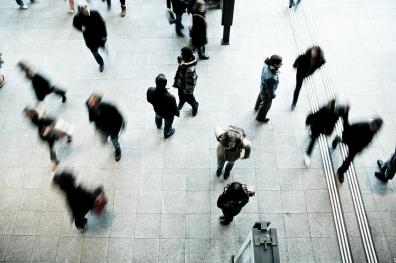

The future of safety in public transport and spaces
Temperature-taking, physical distancing and the use of facemasks will be post-pandemic requirements in public transport and spaces
The CEO of AES, the president of APROSER, the chairman of CEPREVEN and the professor of Epidemiology and Public Health at the European University of Valencia analyse the short- and medium-term future.
Paloma Velasco, CEO of the Spanish Association of Security Companies (AES), states that the companies in this association are ready to offer solutions that ensure safe access and healthiness in all public transport and public spaces. "Obviously, we will not stop using all of them, but there will be a change in how we do it in the future, and our industry can help a lot to do it safely".
Ángel Córdoba, president of the Professional Association of Private Security Companies (APROSER), stresses that the management of pandemics needs to take a comprehensive perspective, in which aspects related to security take on special importance. In this sense, he indicates that "it seems inevitable to expect measures to continue that will be implemented progressively during the deconfinement phase that will ensure suitable access control as unobtrusively as possible, full guaranteeing data protection by qualified security personnel integrated in security companies”.
For Mr Cordoba, it is feasible to think about both the application of new measures and continuation of the current ones, especially the ones for controlling crowd capacity and the ones that ensure interpersonal social safety distances. In this context, "the intervention of private security professionals in the large transport networks has proven to be fully effective during the most critical phases of the crisis, reinforcing the activity of the police forces; and it is reasonable to think of its extension to new public and semi-public spaces from the perspective of citizen security”.
Access control technology
Jon Michelena, the chairman of the Association for Research on the Safety of Lives and Property CEPREVEN, believes that "if everything goes according to plan, we will find ourselves in the new normality with a first stage of compulsory social distancing, with a reduction in the crowd capacity in public spaces and transport, which will surely outlast the obligatory period due to caution or directly out of fear. We will not behave in the same way in public again until there is a vaccine that can be given to the entire population”.
In his opinion, if there is no clear and evident disappearance of the virus, people will shun crowds where they consider strangers to be present, they will keep their distrust of strangers and they will limit their presence in public spaces. And in this situation, "transportation will be one of the most difficult subjects to pass. Combining capacity reduction with profitability, or at least with the viability of transport companies, is a tough challenge”.
Michelena warns that public spaces should be equipped with technical means to control crowd capacity and locate infected individuals by using heat-sensitive cameras. “All of this should be accompanied by a reinforcement of private security to control crowd capacity and people in incidents that are sure to occur, related to fears arising from the pandemic. Let's hope that the new normality will, in time, return to the usual normality. Our culture of living life and sharing will eventually recover all its space, we just have to wait”.
Patricia Guillem, Professor of Epidemiology and Public Health at the European University of Valencia, agrees that transport and mobility in the aftermath of the pandemic pose an immediate and long-term challenge, as both the movement of people and goods are essential and would not therefore be a matter of choice. “People who cannot work from home must commute to their companies, health workers continue to go to outpatient clinics and/or hospitals, small businesses also need their customers to come to them, and supply chains must continue to move smoothly to ensure delivery of needed food and goods”.
In her opinion, the measures that must be implemented in this sector to ensure its safe use, to the extent possible, will be: “limiting crowd capacity, social distancing between users, compulsory individual use of face masks and the recommendation to wash hands frequently and/or to carry a hydro-alcoholic solution”.
According to Guillem, transport won't be the same, either. “There be a need to adapt, more or less temporarily, to keeping physical distance between users and to making individual use of the mask obligatory. But we will also question whether many of our daily trips are really necessary and, if in some cases, we might be able to replace them with more sustainable alternatives that would, in turn, recover spaces for pedestrian mobility or travel in non-polluting vehicles”.
In any case, for Paloma Velasco the key will still be to adapt. Quoting Debasish Mridha, an American physicist and philosopher, the director of AES points out that "wisdom is not always defined by intelligence but by adaptability to change”.





